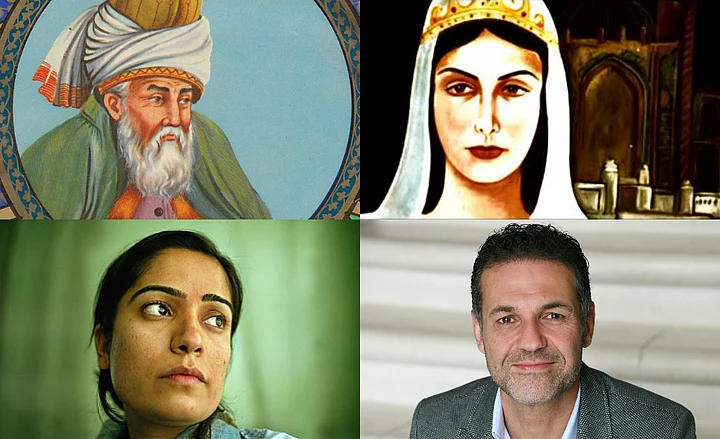“He (Prime Minister Modi) is constantly telling me he built a library in Afghanistan. Library! [...] We are supposed to say, oh thank you for the library. Don’t know who’s using it (the library) in Afghanistan.”Donald Trump, President, USA
Trump’s comments on Wednesday, 2 January, seem to dismiss the value of libraries and especially, their usage by Afghans. A multilingual country with both Dari and Pashto as official languages, Afghanistan mostly makes international headlines for its conflicts. But so should its great literary traditions.
The country annually hosts poetry festivals with an audience of thousands – like the Narinj Gul (Orange Blossom) in Jalalabad and Anar Gul (Pomegranate Blossom) in Kandahar. Its rich literary landscape has only broadened and diversified over time, with Rumi in the 13th century and Khaled Hosseini in the 21st taking the world by storm.
So, the following are a few Afghan writers Trump needs to stock up on in the White House:
Rumi
Although he spent most of his life in Turkey and is claimed by many, Jalāl ad-Dīn Muḥammad Balkhī or Rumi is believed to have been born in Balkh, Afghanistan. He wrote mainly in Dari – the official name of the Persian language in Afghanistan, or Afghan Persian.
The 13th century Sufi poet was greatly influenced by the works of Sanai, an Afghan poet, and Attar, an Iranian poet, writing: “Attar was the spirit, Sanai his eyes twain, And in time thereafter, Came we in their train.”
Rabia Balkhi
One of the first poets to write in modern Persian, Rabia Balkhi was also a native of Balkh, Afghanistan. The 10th century poet influenced several other poets and writers such as Rudaki, Attar and Reza-Qoli Khan Hedayat. Rabia Balkhi Maternity Hospital and Rabia-e Balkhi High School are some of the institutions named after her in Kabul.
The story goes that she fell in love with her brother’s slave, Baktash. Because of this, she was imprisoned and killed by her brother. As she was dying, she wrote her last poems on the walls with her blood.
Mahmud Tarzi
Known as the father of Afghan journalism, Mahmud Tarzi started a new period of change and modernisation in journalism and literature in 1911, through his fortnightly publication Saraj’ul Akhbar. It made a mark on the Afghan literary landscape by causing poetry and lyrics to shift from the personal to the political. He opposed religious extremism and obscurantism, advocating instead for secular ideals.
Tarzi had served as the nation’s Ambassador, the Minister of Foreign Affairs, the Minister of War, and leader of the Constitutionalist Movement.
Parween Faiz Zadah Malaal
Parween Faiz Zadah Malaal is one of the most popular Pashto poets. She was born in the Kandahar province of southern Afghanistan in 1957. She began her career as a journalist by working for Tolo-e-Afghan and Radio Afghanistan. In 1988, she moved to Pakistan. She has published three collections of poetry and two short stories.
She writes about modern Afghan life in the context of exile, set in Pakistan.
Khalilullah Khalili
Born in 1907, Khalilullah Khalili is considered to be the last of the great classical Persian poets and one of the first to bring modern Persian poetry and Nimai style to Afghanistan. Hero of Khorasan, a controversial biography of Habībullāh Kalakānī, Emir of Afghanistan in 1929, is believed to be his magnum opus.
Malalai Joya
Malalai Joya is an activist, writer and former politician. She was dismissed from the National Assembly of Afghanistan in 2007 after calling out the presence of warlords and war criminals in the Afghan Parliament. She is also an outspoken critic of the United States’ ‘War on Terror’ in Afghanistan.
In 2010, she was on Time Magazine’s 100 most influential people in the world. Foreign Policy Magazine listed her in its Top 100 Global Thinkers list. She has written several books on Afghan politics and her own life – in English, French, Italian and Dutch.
Khaled Hosseini
Probably among one of the best known Afghan writers worldwide, Khaled Hosseini was born in Kabul. His family moved to France when he was 11 and then to the US. He retired from his medical practice after his first novel The Kite Runner became a bestseller. He has since continued to be a bestselling author.
His novels revolve around Afghan lives either in Afghanistan or abroad. He is also a UNHCR Goodwill Ambassador.
Nadia Hashimi
Nadia Hashimi is another internationally bestselling Afghan author based in the US. Other than a novelist, she is also a pediatrician and a Democratic congressional candidate for the United States House of Representatives for Maryland's 6th congressional district. She was born in New York to Afghan immigrant parents.
(At The Quint, we question everything. Play an active role in shaping our journalism by becoming a member today.)
